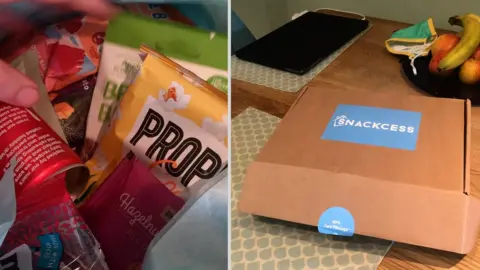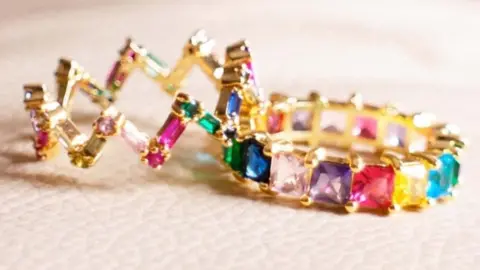CEO Secrets: The graduates launching start-ups in lockdown
As part of our CEO Secrets series, which invites entrepreneurs to share their advice, we are focusing on businesses that have launched during lockdown. Each week we will look at a different type of lockdown entrepreneur. We begin with recent graduates.
Student friends Joshua Barley, Sonny Drinkwater and Kieran Fitzgerald, all aged 22, realised the job market would be tough for new graduates, as the huge impact of coronavirus became clear in March and April.
Joshua and Sonny are old school friends. Joshua met Kieran at the University of Birmingham, introducing him to Sonny, who studied at Bristol.
The three final-year students saw work placements and graduate scheme opportunities disappear in the spring. Job interview processes would draw to an early close, says Sonny.
So they decided to take matters into their own hands and started a company, pooling their abilities and expertise. Both Joshua and Sonny had studied nutrition, while Kieran had been working on the benefits of gift exchange in the workplace as part of his end-of-year project.
They combined these interests to focus on what was clearly becoming an important new fact of life: working from home.
The trio created the company Snackcess, to provide gift boxes of healthy snacks for businesses to post to employees working at home.
The box contains high-end, healthy, branded snacks, the kind that you might find in organic food stores.

The team negotiate lower prices by buying directly from the manufacturers.
When they started in July they sold five boxes. That increased tenfold in August and in September they sold 800 boxes, with a turnover of more than £9,000.
Originally they did the packing themselves in Sonny’s parents' garage in Kent. They have now hired their first employee, a “chief packer”.
Large corporate clients include HSBC, Iress and Lululemon.
The success has resulted in a dilemma for the team.
It was never meant to be a permanent venture, rather they thought of it as a stop-gap, until the economy picked up again and they could find other jobs, explains Sonny.
“That’s all changed now,” he says. “We've had such a big growth, we're going to try and see this through."
Joshua adds: "We see this as a long-term opportunity for us now."
Kieran, meanwhile, has found a graduate placement with HSBC – but reluctant to completely leave the company he helped to found, he is remaining involved in a lesser capacity.
For all three, it’s been a massive learning curve.
“My advice is just do one small thing every day that makes your business idea more real, whether that's setting up a meeting, or building a prototype,” says Sonny.
“And don’t be afraid to network,” adds Kieran. “Just message people on LinkedIn, you’ll be surprised who gets back to you."


Despite the uncertainty of lockdown, many people have taken the opportunity to start their own company.
Almost 50% more businesses were created in June 2020 than in June 2019, according to the Centre for Entrepreneurs. July set a new record with more than 81,000 businesses registered.
There is no hard data on how many of these companies have been started by new graduates. But anecdotally, many final-year students faced with fewer opportunities like entry schemes and internships, have decided to be their own boss instead.
Josephine Philips, 23, says she always had “an entrepreneurial gene”.
She showed it from her first year of university, studying physics and philosophy at King’s College London. She made a tidy sum selling second-hand clothes on the popular Depop app.
But while doing that she nurtured the idea of creating her very own digital fashion platform. She envisioned a “Deliveroo-like service, but for altering vintage clothes”. The concept stemmed from her own experience.
She would often spy a piece of clothing she adored in a vintage shop, but wished it could have a small alteration either to mend it, or give it a more fashionable twist, and didn’t have good enough sewing skills to do this herself.
When lockdown struck in March, she initially put her business idea on hold – but then she realised something.
“All the restaurants were shutting down, but the thing that was keeping them alive was Deliveroo. What I proposed would allow seamsters to keep getting orders in a contact-free way.”
Her business is called Sojo and employs a team of cyclists to collect clothes from people’s homes and take them to and from sewing shops for alterations. It is focusing on west London for now. Judging by beta testing and a huge social media response, Josephine believes the demand is there.
 Sojo
SojoHowever, getting all the interested parties on board has not been easy, Josephine says, because there are credibility problems for young graduates.
“I remember my first pitch. I wore a suit and everything, but [the tailor's] reaction was: ‘How old are you? You look like my 14-year-old daughter.’”
She won him over by using him for a trial period and bringing him 20 new customers and hundreds of pounds in work, she says.
Her business officially launches this month and Josephine says she is not anxious, “just incredibly overwhelmed” with optimism.
She thought she would struggle to recruit the cyclists to collect the clothes, but more than 60 applied for 20 positions.
Her advice to other budding entrepreneurs is this: “Young females like me can struggle with confidence, but you just need to educate yourself in your market. I went to lots of events both online and in person, about things like marketing and pitching to investors, which really helped me.”
 Sehrish Ahmed
Sehrish Ahmed
“If it really took off I would pursue it full-time," says Sehrish Ahmed, 22. “I’ve always wanted to be a business owner.”
The entrepreneurial graduate is now running an online jewellery business called Rose Eclipse, but this wasn’t the original plan.
While studying international fashion branding at Glasgow Caledonian University for the past three years, Sehrish’s mind was set on a career in fashion retail.
To earn some money while studying, and gain experience, she worked on a diverse range of shop floors, including Oxfam, Gap, Mothercare and Victoria’s Secret – in the latter dressing mannequins.
But then Covid struck. “The first thing that went through my mind was that I wouldn’t have a graduation, I wouldn’t walk on that stage, that’s the thing I’d been looking forward to,” says Sehrish.
Then the implications for her future career became clear. Her graduate placements and internships were cancelled.
So she decided to start her jewellery business, which until then had been just a pipe dream.
After looking through samples, she sources her products from China, which are then posted to Glasgow.
 Rose Eclipse
Rose EclipseSehrish’s advice to others in her situation is this: “I think with the majority of graduates being Gen Z, we are very aware of how social media works and we need to use that to our advantage.”
Her sales have been driven by her Instagram and TikTok accounts. She used her knowledge of the platforms to create compelling posts and plug into the latest trends.
“What surprised me was when I started to get sales from people who weren’t just friends and family,” says Sehrish.
She’s now getting dozens of sales a month – not enough to make a living yet, but she wants to see if she can grow the business beyond a side hustle, something she hadn’t considered before.
The coronavirus has thrown many graduates’ plans for the future up in the air. By starting their own businesses, some feel they are taking back control.
You can follow CEO Secrets series producer Dougal on Twitter: @dougalshawbbc
